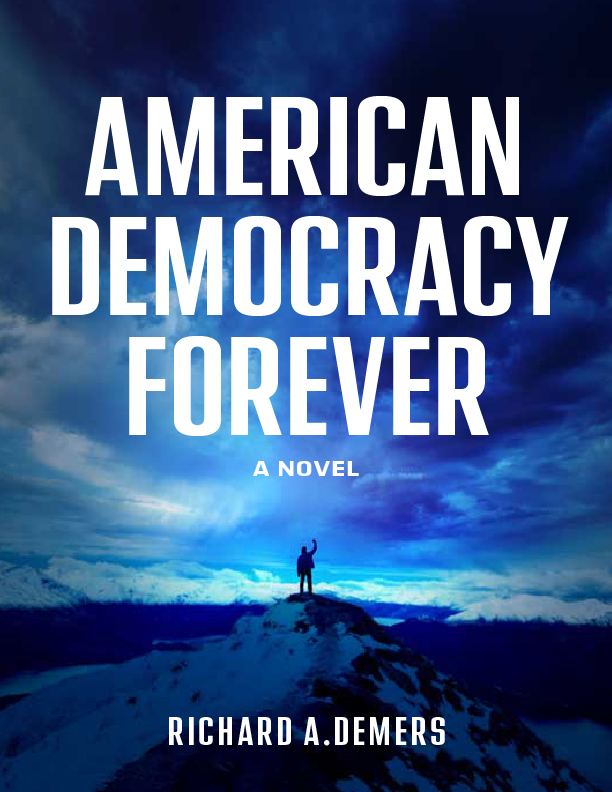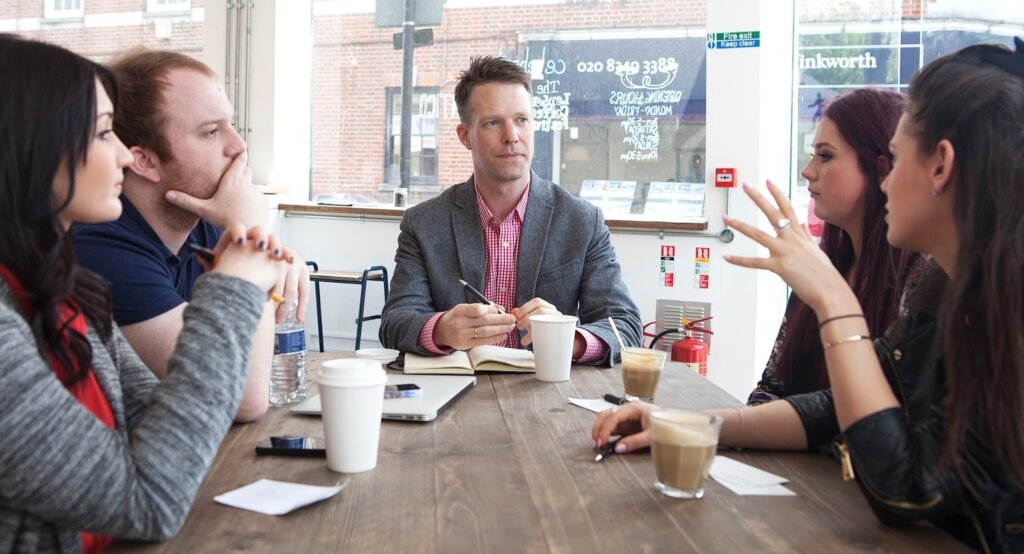Book club questions about American Democracy Forever

Book club questions about American Democracy Forever
The following is a list of questions about the novel American Democracy Forever for consideration by book clubs and other readers.
QUESTIONS
ADF Question #1 Do I have to become the world’s richest man, the world’s greatest organizer, the world’s greatest orator, the world’s greatest entrepreneur, and the world’s greatest humanist? Do I have all that in me? Charlie Durand asked himself, shortly after his awakening as a thirteen-year-old boy in 1960. Does Charlie achieve these goals? Can you cite examples that he has? That he has not?
ADF Question #2 Charlie needs his parents to see him as a mature adult, not just as their thirteen-year-old son, so he answers their questions about America in his Life 1.
Is this just a way for the author to critique the American culture he has experienced? Is it a necessary part of the novel? Are Charlie’s critiques of American technology, religion, culture, and government justified?
ADF Question #3 Charlie tells his parents about the devolution of Christianity from the unity of Catholicism to the ever-increasing fragmentation and perversion of Protestantism. Do you agree with Charlie’s critique of Christianity in Life 1? Do you agree with his condemnation of “prosperity theology” and the political linkage of the Evangelicals to the Republican party?
ADF Question #4 Charlie’s plan is to quickly get rich to counter the cabal of Republican billionaires. He uses his Life 1 memories to invest in the stock market. His dad sees this as illegal insider trading. Charlie responds that his Life 1 memories consist only of publicly available information. Is Charlie justified in using his Life 1 memories to guide his investments? Do you agree with Charlie or his dad? Is he cheating?
ADF Question #5 Charlie’s mom questions his need to get rich to protect democracy. She cites several examples of movements by ordinary citizens to achieve national goals. He responds that he will use his immense wealth to foster and support citizen organizations. Did Charlie really need immense wealth to protect democracy? Could he have created the nationwide network of Forum Clubs without great wealth?
ADF Question #6 Bruce Little begins as a schoolyard bully but quickly becomes Charlie’s best friend. What is the role of Bruce Little in the novel? Why does he stick around? Is he just a hanger on? Is he a stabilizing influence in Charlie’s life? What does it mean to be Charlie’s friend?
ADF Question #7 Charlie created the first Forum Club at his high school as a way for students to discuss their concerns and act on them—always from the bottom-up. They are also social clubs that do a lot of partying. Would you find such an organization appealing? Would you want to join a Forum Club? Would you attend its meetings/parties on a regular basis? Would you participate in its various actions: protests, sit-ins, petitions, marches, etc.? Would you regard your Forum Club as a primary element of your social life? Do your answers to these questions depend on your age?
ADF Question #8 Can a large organization of citizens remain bottoms-up in its structure nd processes, eschewing a formal hierarchy and a “Great Leader?”Aren’t humans essentially hierarchical, with some people always seeking to climb the ladder of success in whatever hierarchy they find themselves?
ADF Question #9 The Forum Clubs are linked to each other by their Committees of Correspondence, thereby forming a neural network able to solve problems via discussions among multiple clubs. Is a neural network the best way to organize Forum Clubs? Would the same ideas work for other organizations?
ADF Question #10 Charlie created the Forum Media Group to provide a “bubble of liberal thought” over the entire nation, in contrast to hate and lie filled right-wing radio and television. Is organized, well-funded, liberal media necessary to preserve American democracy? Who should fund it?
ADF Question #11 Watching a friend die from AIDS reminds Charlie that he also has to do something about the pandemics he experienced in Life 1, particularly COVID-19. He focuses on the problems of adequate medical supplies and personnel, so he creates MedSupply and works to finance it. Do you think warehouses of stockpiled medical supplies is a promising idea? Pandemics are nothing new and will always be with us. So, what do you think we (our government and scientists) should do? Do you think billionaires would be (or should be) anxious to finance such warehouses—especially if their name were on them?
ADF Question #12 Many years after founding the first Forum Club, Charlie attends one of its meetings. He is encouraged by its continuing vitality, but he is surprised by the semi-religious nature of its meetings. Have Forum Clubs become a civic substitute for organized religion? Are they compatible with the theistic religions of some of its members? Are Forum Clubs a “religious home” for atheists?
ADF Question #13 Recognizing that certain problems identified by the Forum Clubs need more research and development than the clubs can provide, Charlie creates CARPA, the Civic Advanced Research Projects Agency. He gives it four initial problems to work on: prison reform, tax reform, voting reform, and transportation financing. The Federal government finances DARPA for defense research, and ARPA-e for energy research. Shouldn’t the government be financing CARPA for civic problems? But if they won’t, why not use a billionaire’s wealth to do what government inertia won’t do?
ADF Question #14The Forum Clubs develop the idea of prison reform through human supervision of felons aided by GPS based monitoring. CARPA models, prototypes, and develops these ideas. Would you support the idea of supervised monitoring? Would you consider time spent being monitored as adequate punishment for crimes, depending on the crime and level of monitoring?
ADF Question #15 The Durand family has a long discussion about reforming income taxation and conclude that a much simpler system is desirable. They run these ideas through the Forum Club network and commission CARPA to model, prototype and disseminate the ideas first to the states and then to the federal government. Are you indignant about the inherent unfairness of the current income tax system? Do you agree that a thorough reform based on innovative ideas is necessary? What is your opinion of the reforms proposed by the Durand family?
ADF Question #16 While the life of Donald Trump in Life 1 and Life 2 is discussed, it isn’t until the 2000’s in Life 2 that the novel discusses him in detail. While the novel’s Donald mimics that of a live character, does it go overboard in describing his threat to democracy? Does it go far enough?
ADF Question #17 Comedians and a ventriloquist mock Donald Trump. Is this a necessary part of Charlie’s scheme to discredit Trump? Or is the novel just being mean-spirited?
ADF Question #18 Charlie told the story of Satan vs the Virgin Mary to convince the Forum Clubs that they need to be aware of the forces arrayed against democracy. It becomes one of many parables that guide their mentality. What role does mythology play in the Forum Clubs? Does it enhance group unity and purpose?
ADF Question #19 In many ways, Charlie’s Satan matched the Satan of traditional Christian religions. He was “the ‘great deceiver,’ a teller of lies designed to make you lose your ability to distinguish lies from the truth, to lose your ability to think for yourself, and to give your mind and soul over to the ‘great manipulator.’” But unlike the Christian’s Satan, Charlie’s Satan was real and already among them. Should Charlie identify Trump with Satan earlier in the novel? Is this
identification justified?
ADF Question #20 In his rallies before the 2022 election, Trump mimics certain aspects of Nazi crowd control tactics to enhance solidarity among his supporters and Charlie does the same in his PEP Talks.Was this a good idea? Does it brand the Forum Clubs as no better, no less extreme than the Trumpists?
ADF Question #21 Ronald Reagan, Bill Clinton, and Barack Obama are characters in the novel, but their presidencies are not discussed in depth. Are these characters treated fairly, or are they just used as historical context?
ADF Question #22 Charlie reaches an age for retirement and assumes an emeritus status in the Durand family’s efforts to preserve democracy. He turns over the leadership of the family to the next generations, including the dispersal of his wealth, to preserve democracy. Is Charlie abdicating his responsibilities? Has he seen too many examples of old people unwilling to get off the stage and let their descendants become the leaders needed to continue their work?
ADF Question #23 The Durand family continues Charlie’s bottoms-up approach by dispersing funds to Forum Clubs for political actions, confident that the clubs know best how to spend in support of political, Democratic, candidates at local, state, and national levels. Are they being naive, thinking that local people can make the best decisions? Is it true that “all politics is local?”
ADF Question #24 The novel provides alternative endings: Trump becomes a dictator or America persists as a democracy. Which ending fits the novel better? Which did you prefer? Why?
ADF Question #25 In Life 3, Charlie again awakens to a new reality, but on the same day and this time in a different body. What do you think of Charlie awakening as a Black boy? Do you think he will rise to the challenges that implies and work to enhance American racial justice?
ADF Question #26 Charlie claims the Forum Clubs are independent, that they decide which issues to pursue and what actions to take. Does he really stay in the background and let the Forum Clubs work from the bottom up and act independently? Or does he manipulate them and, in effect, become their de facto “Great Leader?”
ADF Question #27 Both Charlie Durand and Donald Trump are billionaires used to getting their own way. How does Charlie’s style of leadership compare with that of Donald?
ADF Question #28 What was your favorite scene or chapter in the novel?

